#Gullah Geechee community
Explore tagged Tumblr posts
Text
Black Residents Of Gullah-Geechee Enclave In Georgia Angered After Zoning Changes Pose Threat To Their Community
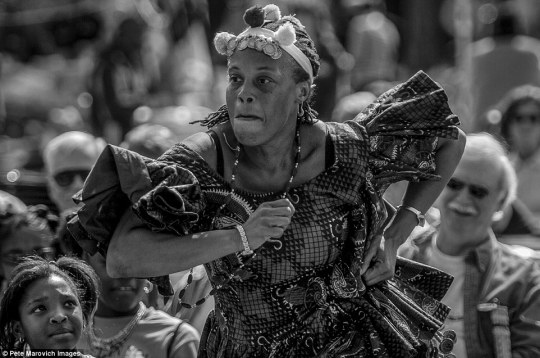
This small enclave is home to a majority of Black residents who are members of the Hogg Hummock community, which is also sometimes referred to as Hog Hammock. According to The Cultural Landscape Foundation, “Hog Hammock was one of fifteen African American Saltwater Geechee settlements on Sapelo Island, Georgia.
The Geechee are descendants of enslaved West Africans brought to work on Sea Island plantations along the Atlantic coast.” Sapelo island is located approximately 60 miles south of Savannah, Georgia and is only reachable by boat.
Almost three decades ago, the county adopted the zoning restrictions, “with the stated intent to help Hogg Hummock’s 30 to 50 residents hold on to their land,” the Associated Press reports.
But the McIntosh County’s elected commissioners recently voted 3-2 vote to change the restrictions. Now, Black residents fear that wealthy buyers will be prioritized over them, which could lead to increases in taxes.
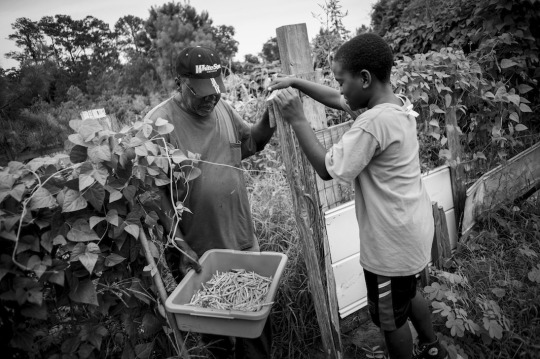
Residents also anticipate this could cause them to be pressured to sell their land, most of which has been in their family for generations. Atlanta resident Yolanda Grovner originally had a plan where she would ultimately retire on her island native father’s land that he owns in Hogg Hummock, but now she worries this might not be able to happen. Yolanda’s father George Grovner attended the meeting wearing a sticker, which read “Keep Sapelo Geechee,” in defiance of these planned zoning changes.

“It’s going to be very, very difficult,” said Yolanda, continuing, “I think this is their way of pushing residents off the island.”
In recent years, the population on Hogg Hummock has been shrinking because some families have sold their land to outsiders. David Stevens, Chairman of the Commission, said he’s been a visitor on Sapelo Island since the 1980s, and places the blame for these changes on those who are selling their land.
This could be partly true, as the vote followed new construction builds. The commissioners ruling “raised the maximum size of a home in Hogg Hummock to 3,000 square feet (278 square meters) of total enclosed space. The previous limit was 1,400 square feet (130 square meters) of heated and air-conditioned space,” per the Associated Press.
Stevens stated, “I don’t need anybody to lecture me on the culture of Sapelo Island.” “If you don’t want these outsiders, if you don’t want these new homes being built...don’t sell your land,” Stevens concluded.
But the remaining residents have vowed to keep fighting these ordinance changes, and it’s not a new phenomenon for them to fight with the local government either. In 2012, dozens of residents and landowners were able to successfully appeal property tax increases.
In addition, many have spent years “fighting the county in federal court for basic services such as firefighting equipment and trash collection before county officials settled last year,” writes the Associated Press.
Maurice Bailey is a native of Hogg Hummock whose mother Cornelia Bailey had deep roots to the island. Bailey was a Sapelo Island celebrity, keeping the community’s voice alive with her storytelling before she died in 2017. Maurice said, “We’re still fighting all the time,” adding, “They’re not going to stop. The people moving in don’t respect us as people. They love our food, they love our culture. But they don’t love us.”
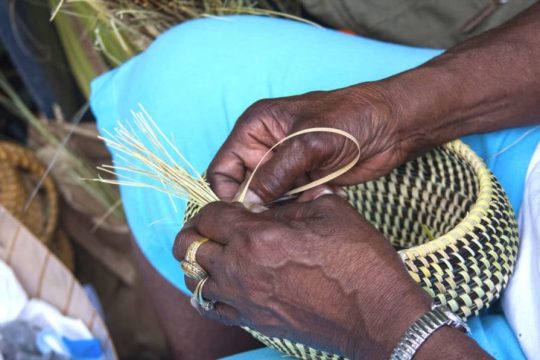
Some legal experts have hinted at due process violations as well as concerns about encroachment under the equal protection clause.
This issue becomes more complicated given the racial demographics of the county. Hogg Hummock is on the National Register of Historic Places, and in order for the Gullah-Geechee community to receive protections “to preserve the community, residents depend on the local government in McIntosh County, where 65% of the 11,100 residents are white,” says the Associated Press.
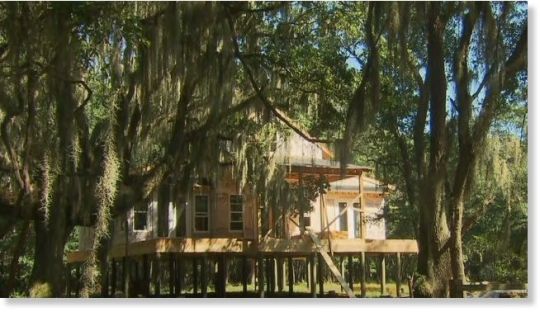
#Black Residents Of Gullah-Geechee Enclave In Georgia Angered After Zoning Changes Pose Threat To Their Community#sapelo#georgia sea islands#Gullah Geechee#Lowlands#Hogg Hummock#Sapelo Island#Gullah Geechee community
35 notes
·
View notes
Text
Absolutely shattered by the tragedy on Sapelo Island, GA yesterday.
It's a very small community of Gullah Geechee people and the ferry gangway collapsed at the end of a day of cultural celebration.
At least seven people are dead. More are missing or in critical condition.
I don't know of alternative links for aid at this time, but I know the Sapelo Island Cultural and Revitalization Society has a donation link for their organization at the bottom of the page and can use all of the help they can get.
The community of Hogg Hummock itself is mostly compromised of older residents on fixed incomes, so any assistance to help them get through this tragedy would be a big help.
#gullah geechee#Sapelo island#black culture#cw death#fundraiser#I don't know what to tag this for attention so please please share#I'd include SOLO as another route for donations but afaik that's only run by one guy and I can't find any word if he's okay#I am not Gullah Geechee and I do not live on Sapelo but this community has my full support and love#The linked organization is run by Gullah Geechee people directly
4 notes
·
View notes
Text
Unity in the Black Community
WE. ARE. JUDEA.
1) Tribes in Kenya have traditionally circumcised for generations
The example below is from the Masai people


(source)
FYI: Kenya is south of Egypt and Israel. Meaning they're close-ish to a lot of Biblical narratives.
Circumcision is a significant sign of a covenant with Yahuah.

2) The Meru people (also from Kenya) have an oral historical account that tells of them crossing the Red Sea BY A MAN DIVIDING THE WATER
BY STRIKING IT
WITH A STAFF.
THATS OBVIOUSLY MOSES.

(source)
3) THE EUROPEANS HAVE BEEN BAMBOOZLING US.



UTTERLY BAMBOOZLING US.

They've been hiding this information from us because we would know that Exodus and Joel is VERY applicable to us.
Don't you think it's weird that they never encourage Exodus or Joel readings in popular Christian outlets?
So here we are Yahuah's people... lost, drunk, and afraid... Forgetting our strength and integrity.
It's time we gird our loins.
Like the song below alludes to, we're still slaves (chains clanging to the sound of an army march)
They never freed us, they only gave us the illusion of freedom.
The army for many black men is servitude. They don't tell you the good positions in the army is locked behind bachelor degrees BECAUSE THEY DON'T WANT YOU TO KNOW.
WE'RE MEANT TO BE THE FODDER.
Let's be so for real, how are we ever going to be free in America? In this current system?
We are systematically enslaved.
The education system purposely ensures that this system self-perpetuates. The castle is on our people's shoulders, and they give us the illusion that we are choosing to uphold it
No, we are not. We didn't choose to be sold from our homeland, we didn't choose to be enslaved all around the world, and we did not choose to be the backbone of America.
We were brutally forced to, and we are practically corralled to today.
We are the foot soldiers of America, we are the servants, and we are the cogs.
Cogs blinded to the fact that we don't have to be cogs, neither do our children.
We can lead ourselves as Yahuah's people.
#unityintheblackcommunity#african diaspora#pan africanism#west africa#north africa#east africa#caribbean#black power#black history#black panther#black culture#black community#black conscious#black femininity#black politics#ghana#nigeria#jamaica#haiti#gullah geechee#south africa#burkina faso#free haiti#guinea#freedom#kenya#kendrick lamar#serena williams#crips#vince staples
1 note
·
View note
Text
1 note
·
View note
Text
Haint Blue and Indigo: The Colors of Annie and Smoke
This is by no means an extensive history of haint blue and indigo*, but I just wanted to dip a bit into how much is said just by looking at one layer of costuming for Sinners. In this case color—how it's able to convey just how deeply rooted Annie is to her heritage/history, and to me, how this case of colors shows so beautifully Smoke's connection to Annie and his love for her.
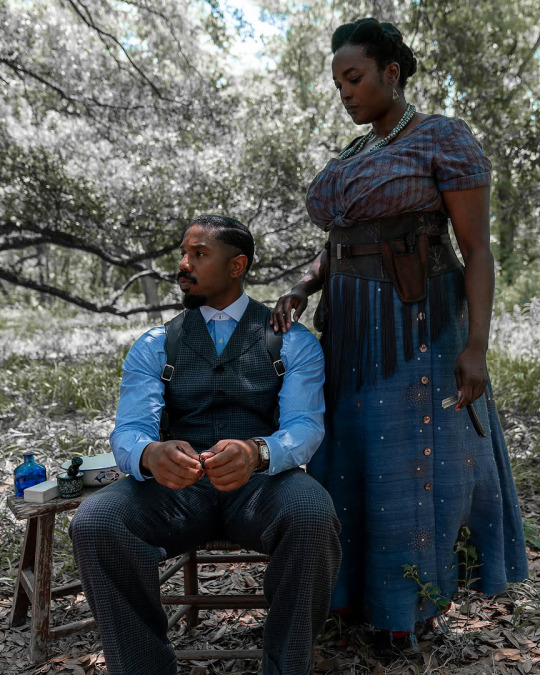

"There's that haint blue that Annie lives around as part of a spiritual color. So I took the haint blue and used it in her clothes. I wanted her to have these layers. You first meet her [...] She's a community person. She's a healer, a spiritual leader." - Ruth E. Carter, Costume Design for Sinners (emphasis mine)
Haint blue is a color seen painted on porches, doorways and windows in the American South. As the name suggests, it was believed (though the oral histories are difficult to come by beyond the 30s), to ward off evil spirits. Using haint blue, according to the Gullah-Geechee, tricked evil spirts into thinking they had come across water or sky, bodies they were unable to cross, therefore deterring them from crossing over the blue.
Annie's costume was infused with this color; the blue on her cotton blouse and her skirt belted with feathers and beads. When we're introduced to Annie, her home has a collection of blues: from the wooden panelling, scraps of fabric hanging in the background, and blue bottles strewn about. This infusion of haint blue in her home is also a deliberate choice as talked about by production designer Hannah Beachler.
*Corrections, whether through comments or reblogs, for this post are definitely welcome! I cite my sources at the end of this long post.
This type of blue is not a specific color but rather, it becomes Haint Blue when it is used for the purpose of warding off haints, a belief rooted in Gullah-Geechee beliefs. (Though for technicalites' sake, it is a range of blues -> blue greens). After the 1800s, this way of using blue trickled down from the Gullah-Geechees in South Carolina to places such Louisina where Annie is suggested to be from.
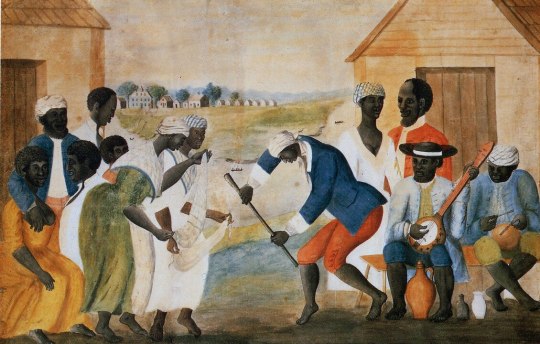
The Old Plantation (Slaves Dancing on a South Carolina Plantation), ca. 1785-1795. watercolor on paper, attributed to John Rose, Beaufort County, South Carolina
Blue has always had a fraught history with enslaved Native Americans and Africans. The production of indigo was a profitable commodity demanded by the British empire as early as the 18th century. This production of indigo however, while it oppressed, was also a way for Black and Native Americans to express their individuality, and for people such as the Gullah-Geechee, their spirituality. Annie continues to draw strength from her roots and it's incredible to see it so profusely in so many aspects of her character, including her clothes.

So here is where I deviate a bit from "canon" per se, or give some interpretation of Ruth E.'s and Coogler's "Smoke is blue." We talk a lot about how the movie does a great job of showing how, though Smoke wasn't completely "sold" on hoodoo, but that he did very much believe in Annie. And that trust between them goes beyond what Smoke's willing to communicate through words (he wears the mojo bag through the war, through Chicago, and removes it only when he's ready to die. How he let's her take the reigns when talking to Cornbread. How he follows through with his promise as painful as it was).
"Smoke is blue. Stack is red." - Ruth E. Carter explaining how Ryan Coogler first posed the characters to her as a jumping off point for costuming.
Whether or not it's a conscious knowledge, I like to think that he dresses in blue as an extension of that trust. That bond between Annie and Smoke and the protection that comes with it bleeds into something as "ordinary" as Smoke's choice of color. One can say that maybe the color reminds him of Annie, and I also think there's some argument to be made about the universe answering Annie's prayers of protection, wrapping Smoke in an extra layer, another ward against evil.
----
Sources:
Blue Roots by Robert Pickney
Red, White and Black Make Blue: Indigo in the Fabric of Colonial South Carolina Life by Andrea Freeser
Haint Blue, the Ghost-Tricking Color of Southern Homes and Gullah Folktales
What the Color ‘Haint Blue’ Means to the Descendants of Enslaved Africans
Interviews of Ruth E. Carter and Hannah Beachler linked in the pull quotes above.
#again! corrections are very much welcome#i just really love all the ways their love for each other is manifested and how it has a extra branch of reinforcement being grounded#in their historical roots and mutual trust of each other#i love how annie's costume was also put together the way it eventually looked bc of wunmi describing her character's story to ruth e.#smoke x annie#elijah moore#annie#sinners 2025#sinners#long post#history#smoke#annie sinners#smoke sinners#annie x smoke
887 notes
·
View notes
Text
I do have to say one thing about a particular scene in "Sinners" that was another red flag about Remmick's intentions....
*spoilery things ahead*
I couldn't get over how insidious it was of him to use our ring-shout ceremony to force-assimilate the Black juke joint folks into his little vampire cabal.
That clockwise and counterclockwise dancing in a circle is so powerful for us. We did it in Congo Square, among the Geechee/Gullah in the low country, and elsewhere. It is the place of communing with spirits to put us in a trance-like state to open that doorway. We use it in Hoodoo, Voodoo, Candomble, Obeah and other syncretic religious off-shoots that we've created and used throughout the Black Diaspora to bind us with our ancestors and call down our Gods/Orishas/Loas to often ride us like horses.
For him to use our most intimate way to connect with our own for his nefarious use--forcing us to dance to his music, and sing HIS Irish songs--offended me the best way in a movie. Ryan did his homework! I almost shouted in the theater, "Oh, no this dude did not just use our cultural practices to uplift him and his own. Tricking them into thinking they were the same."
Anyhoo, shout out to the ring-shout. The details in this fucking movie still blow me away. The ring-shout dancing is liberation for us and often had be done hidden away in the woods. Watching it used to enslave Black people again was intense.
Sidenote: Jack O'Connell was dancing his ass off and I'm so happy he got to get back into his Irish dancing roots himself! Somebody throw on Beyonces "Riverdance"! Lol!


235 notes
·
View notes
Text
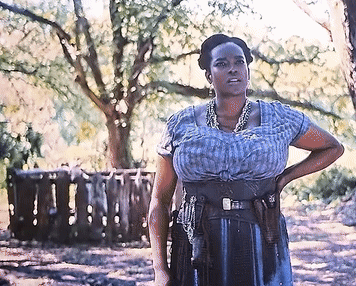
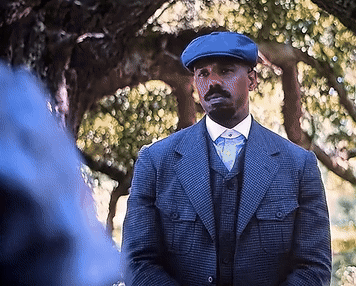
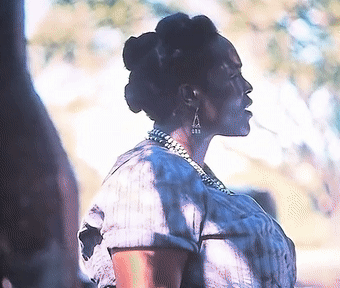
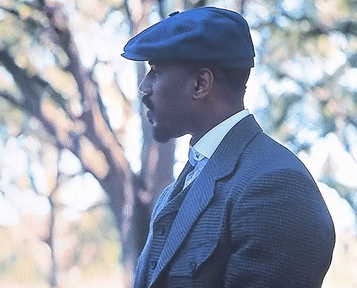
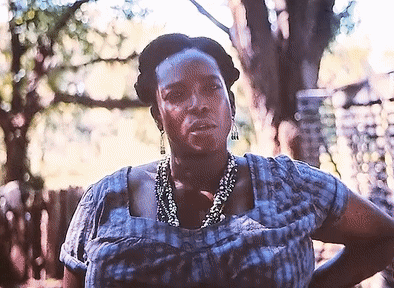
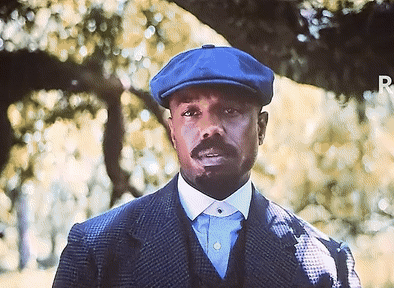
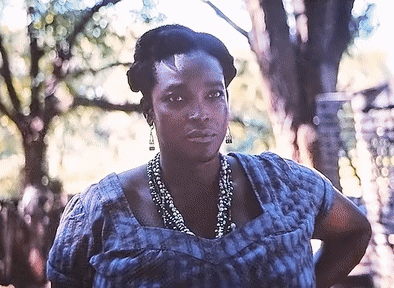
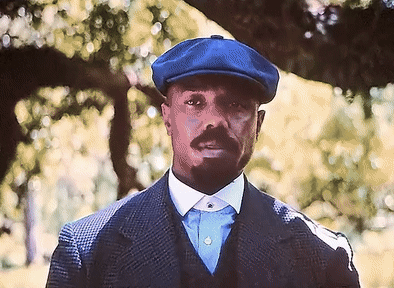
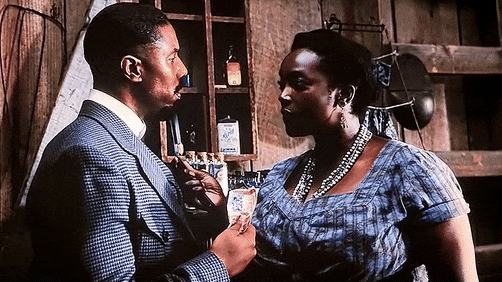
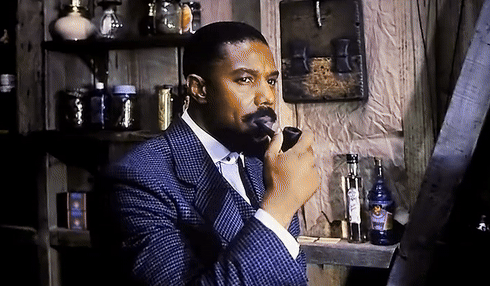
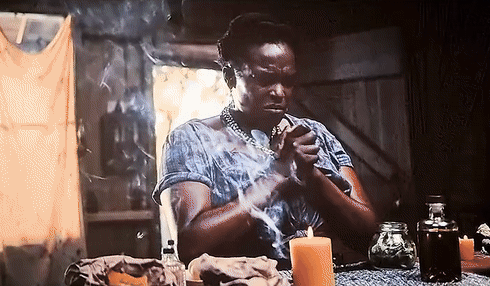
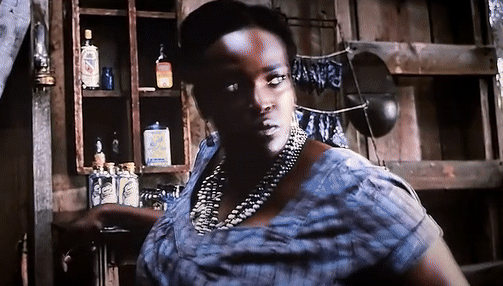
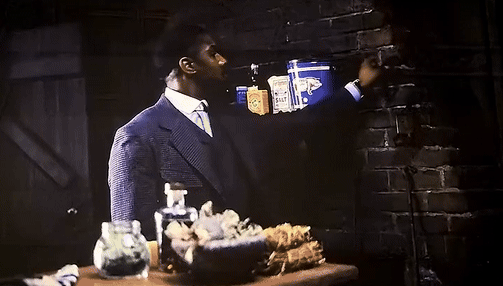
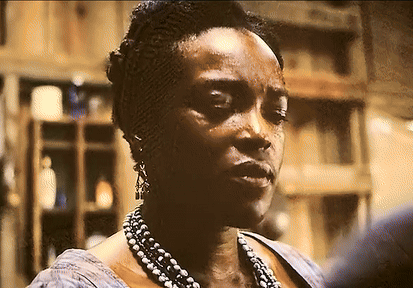
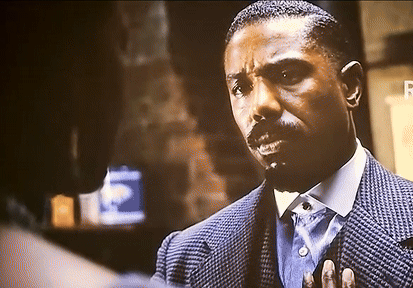

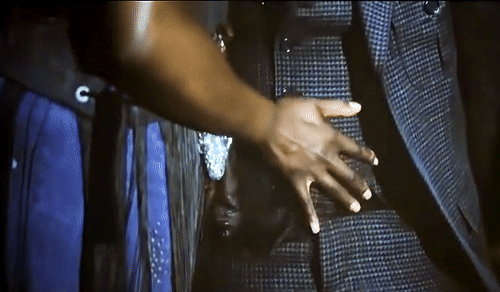
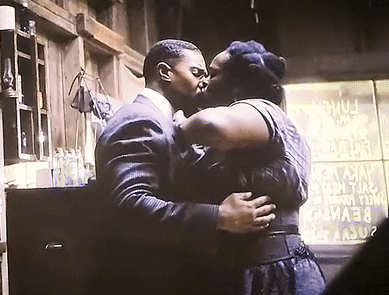
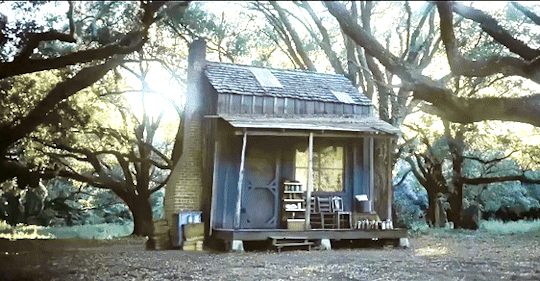
Haint Blue in Sinners: Annie & Smoke
In Gullah, the word haint means "spirit," and usually refers to the more malevolent poltergeists (x)--evil spirits who escaped their human forms at night to paralyze, injure, ride (the way a person might ride a horse), or even kill innocent victims (x). When the European colonists came to the New World, they tried many different crops in the colonies to see what they could grow that would represent the best economic bang for their buck. Indigo, a crop so labor-intensive to produce that it was considered “blue gold,” was the winner.... Successful in the Lowcountry, [indigo] became the biggest exploited item from the New World in a few short years (x). [Blue is a sacred color with] the power to protect enslaved Africans and their descendants, known as the Gullah Geechee, from evil spirits. But the color was also the source of incomparable suffering. (x) The need for indigo cultivators spurned on the kidnapping and enslavement of hundreds of thousands of people from West and Central Africa. These people banded together to create communities, and their beliefs came with them. They used the dregs of the dying vats and mixed the blue with lime and other chemicals to make a robin’s egg blue, which became known as “Haint Blue.” (x) It was so close to the color of both the sky and the sea...that it became used to keep evil spirits away. Painting the Haint Blue on windowsills, shutters, doorways, and even the verandas’ ceilings kept the spirits and Boo Hags away. The color would cause confusion, as a ghost would think they had stumbled into a body of water (which they cannot cross) or stepped out into the open sky.... Older houses in [the South] often have bright blue shutters, roofs, and fences; it’s keeping out the evil spirits while allowing the good ones to stay and guide the younger generations. (x)
-- What the Color ‘Haint Blue’ Means to the Descendants of Enslaved Africans | Boo Hag & Haint Blue: Vampires of the Lowcountry
#sinners#sinners 2025#religion#africa#black girl magic#black is beautiful#vampires#must see tv#the hype is real#read a dang history book
146 notes
·
View notes
Text
SoulAce Day 2026
Hey y'all, mark your calendars for SoulAce Day'26 .. February 16th, 2026 is a day for us African American Asexual folks to share and highlight our content from art to activism within Ace communities.
This day was created by me (Gentle Giant Ace), The Asexual Goddess, and YaGirlLici to highlight the intersectionality between Asexuality and the various cultures within the ethnicity that is African Americans (descendant of enslaved African folks taken to the states from the 1600s to the 1800s,fyi)...
Gullah Geechee and Asexual?
Affrilachian and Asexual?
Chicago Mississippian and Asexual?
Afro-Mississippian and Asexual?
Afro-Nova Scotian and Asexual?
Tidewater Creole and Asexual?
(examples)..
This day is for you to express yourself and how your content is influenced by your intersectionality.
#asexual#asexuality#lgbtqia#ace pride#lgbtq#queer#queer community#lgbtq positivity#art#african american#culture#soulace day
70 notes
·
View notes
Text
https://x.com/Phil_Lewis_/status/1703407420515442919?t=KZA9wU6ZOvHpoTyQobuXKQ&s=09

For over 230 years, Gullah-Geechee people called Georgia's Sapelo Island home County commissioners voted to remove zoning restrictions & to strike language stating it should prevent “land value increases which could force removal of the indigenous" folk
For more than 230 years, a small community of Gullah-Geechee people have called Sapelo Island off the coast of Georgia home. Hogg Hammock, the area on the island where these descendants of enslaved people live, is a 427-acre coastal community of 40 residents and has been designated as a historic site since 1996. That means that the construction of houses more than 1,400 sq ft and any road paving or demolition of property are strictly prohibited to preserve the island community.
On Tuesday, McIntosh county commissioners, who preside over Sapelo, voted to remove zoning restrictions in Hogg Hammock. Gullah-Geechee residents fear that wealthy transplants who want to develop larger homes and who could force a rise of property taxes there will displace them and upend their livelihoods.
The county, which is 65% white, has voted to remove official language that acknowledges Hogg Hammock as an area with “unique needs in regard to its historic resources”. It will also strike language that states it should prevent “land value increases which could force removal of the indigenous population”.

Last Thursday, dozens of residents gave hours of testimony to the county’s zoning board arguing against the proposed changes, warning that the county had hastily made changes without community consideration. Reginald Hall, a landowner whose family had roots in Hogg Hummock, told the Associated Press the county’s approval would amount to “the erasure of a historical culture that’s still intact after 230 years”.
Residents and state lawmakers called for the county to delay their vote and to reflect on proposed changes for 90 days. “We will not allow our cultural history to be erased or bought at the price of land developers,” the state representative Kim Schofield, who represents Atlanta, told reporters. “This is our history and our heritage, and we will fight to protect it.”
Hall warned the county’s vote to remove development limits would give Gullah -Geechee residents in Hogg Hammock just “two to three years at most” to survive in the county before they scatter elsewhere, as 200,000 Gullah-Geechee people have already done across the south-eastern corridor of the United States. “If you talk about the descendants of the enslaved,” she said, “90% of us will be gone.”
16 notes
·
View notes
Text
The Gullah people are descendants of African slaves who live primarily on the Sea Islands and coastal regions of South Carolina, Georgia, and parts of Florida and North Carolina. Brought to the region from West Africa in the 18th century for their agricultural expertise, especially in rice cultivation, they developed a unique culture influenced by their African heritage and isolation from the mainland due to the region's geography.
Their language, also called Gullah, is a Creole blend of English and various West African languages. It serves as both a functional means of communication and a cultural link to their African roots. Gullah culture is renowned for its vibrant traditions, including storytelling, spiritual practices, cuisine, and folk arts like basket weaving, which have been preserved over generations.
The Gullah culinary tradition—characterized by ingredients like rice, seafood, and okra—is a foundation of Southern soul food. Additionally, Gullah music, spirituals, and dance have significantly influenced broader African American culture.
Today, the Gullah/Geechee Cultural Heritage Corridor, established by Congress, protects and promotes Gullah heritage. Despite pressures from land development, the Gullah people continue to celebrate and preserve their history, representing a profound connection between African and American cultures.
42 notes
·
View notes
Text
"RCTAs only transition to Japanese or Korean!" Is bullshit. I've interacted with R/ESUs that're transitioning to the following:
African American, Arab, Argentinian, Bahamian, Bulgarian, Chilean, Cuban, Filipino, French, Gullah Geechee, Han Chinese, Hawaiian, Indian, Irish, Italian, Lao, Louisiana Creole, Malay, Mexican, Mi'kmaq, Moroccan, Navajo, Norwegian, Nunatsiavummiutitut Inuit, Persian, Portuguese, Russian, Singaporean, Spaniard, Sudanese, Tatar, Thai, Tswana, Vietnamese, and Ryukyuan. (If anything is spelt wrong please tell me)
And that's just how many I've interacted with! I've seen so many more than that (listed under cut because no one cares I think), so can we please stop saying stupid stuff like this 🙏
Italicized Word Meanings
RCTA = "Race Change To Another"; this isn't a good term to use because of who the creator was, and their intent while making it. More info here + I don't support nor use this term, I only use the tags for reach! R/ESU = "Race/Ethnicity Subliminal User"
The kinds of R/ESUs I've seen in my time being a part of the community:
Afro-Cuban, Ainu, Albanian, Armenian, Belarusian, Cantonese, East African, Estonian, Filipino, French, German, Hawaiian, Hmong, indigenous Brazilian, Italian, Jamaican, Javanese, Jingpo, Kazakh, Khmer, Kurdish, Lao, Lithuanian, Louisiana Creole, Maltese, Mexican, Moroccan, Nepali, Nigerian, North Korean, Norwegian, Pamiri, Polish, Qatari, Ryukyuan, Sakhan, Scottish, Senegalese, Siberian, Southern Yamato Japanese, Sri Lankan, Sudanese, Swedish, Tajik, Thai, Tibetan, Turkish, Uzbek, Venezuelan, Vietnamese, Yemeni, Zainichi Korean, and probably more but I cant rememebr
#ctde#ctdr#esu#rsu#ethnicity subliminal user#lao#lao ctde#lao ctdr#lao esu#vietnamese ctde#vietnamese ctdr#vietnamese esu#vietnamese rsu#lao rsu#rcta#ecta#race subliminal user#transx#transid#translaotian#translaos#transethnic#transnationality#diaethnic#dianationality#transvietnamese
16 notes
·
View notes
Text
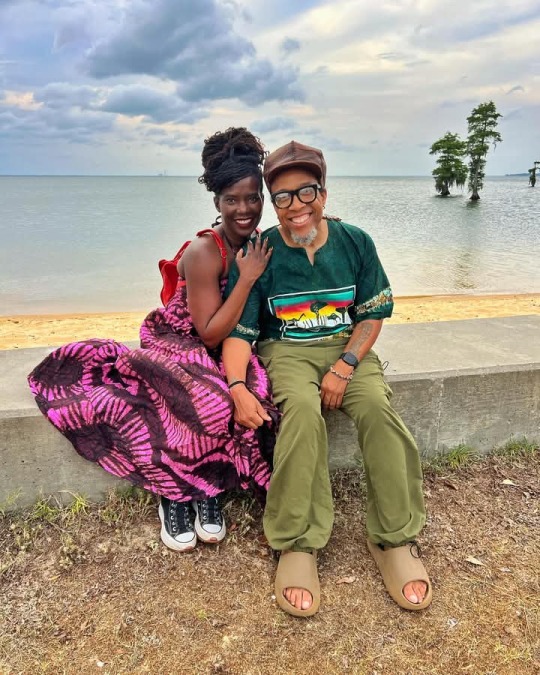
Speech and his wife spent time in Gullah land, South Carolina, the ancestral home of the Gullah Geechee people. Their culture, born from strength and survival, lives on through language, music, food, and deep community roots.
Courtesy of Arrested Development (Facebook)
18 notes
·
View notes
Text
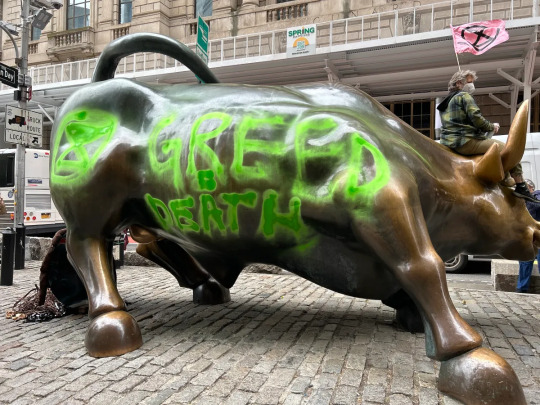
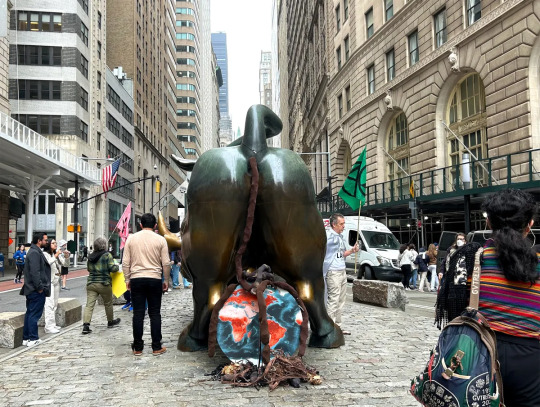
https://hyperallergic.com/1005520/climate-protesters-target-nyc-iconic-charging-bull-in-earth-day-protest/
Aliyah Graves, a hybrid office worker who was on her way to work with an iced coffee in hand, told Hyperallergic that while she was not familiar with the climate emergency group, she immediately understood their message.
“I think a lot of people are fed up with how things are going,” Graves said. Referencing her own Gullah Geechee heritage, she pointed out the amplified impact of climate change on Indigenous communities and groups with cultural practices rooted in land stewardship.
“I think lawful disobedience is needed in a society, that’s what makes a democracy great,” Graves.
15 notes
·
View notes
Text
#Real estate developers are the real threat to Gullah Geechee culture#vital community#vital information exchange#vitalportal#thevitalportal#additional information#vital media#blacklivesmatter#vital politics#blacktwitter#myvitaltv
0 notes
Text
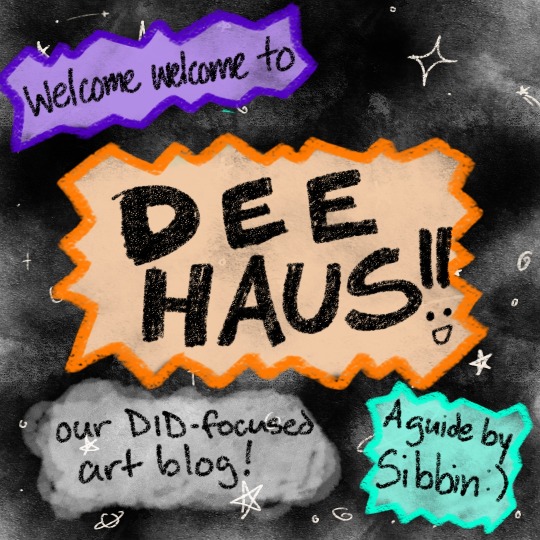
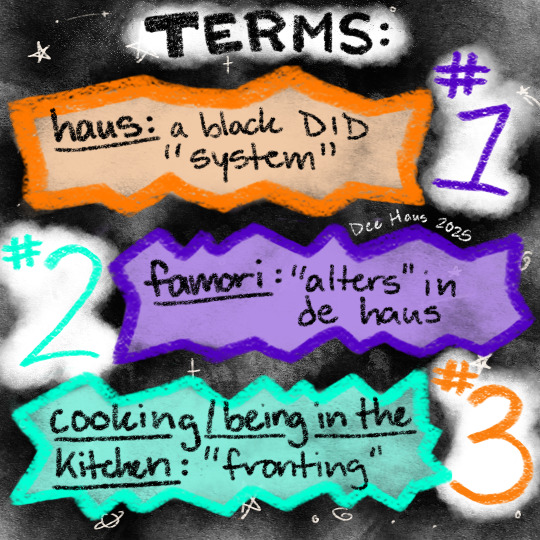

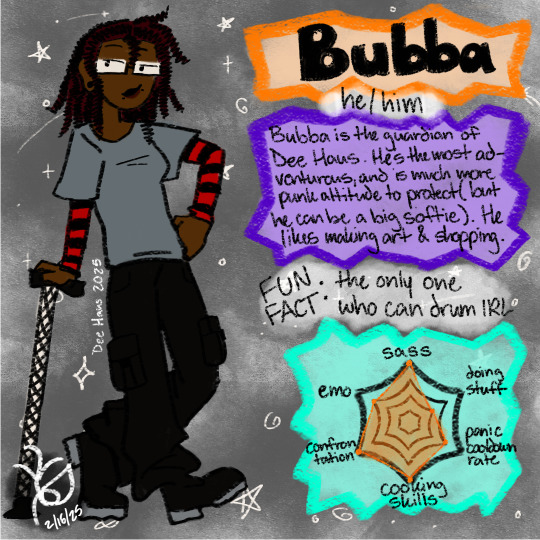
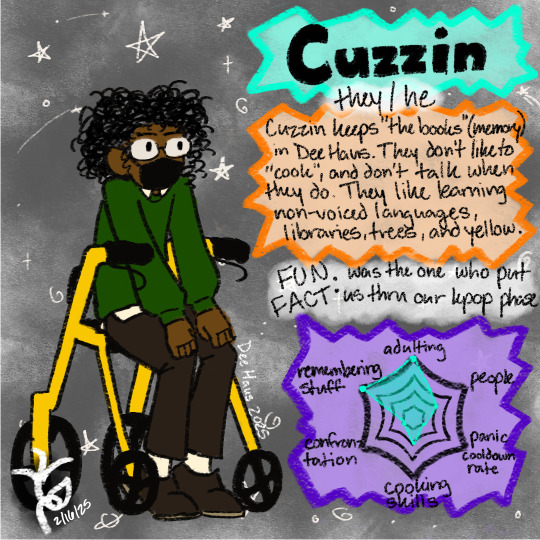
Yayyy Haus Intro! (plus the text for the pictures!!!!)
*** Check blog intro post more details on us!***
Welcome welcome to Dee Haus!! Our DID-focused art blog! (A guide by Sibbin :))
Terms: (familiar term in quotations)
Haus: a black DID “system”
Famori: “alters” in de haus
Cooking/being in the kitchen: “fronting”
The term haus being used specifically for Black systems is not at all a thing, I’ont think. But our haus uses it for us, and as a system who is Black in de bodi and loves our kulcha and words, we would love to see it be claimed as that and invite any black-bodied system to do so!! We chose it because a lot of Black households use the term “house” instead of home I noticed, and then as we learned more about hoodoo and vodou, it turns out historic Black folk magic gatherings for protection were often in AAVE called the “haus” dey was under (like Marie Lavaeu haus) So if Haus is a place of protection and healing, what better a name for our system :) ((also: I'm not tryna limit haus' usage as a word only fa us since I know it exists in other languages too. But I long for our black community to have more words for us neurodivergent folx in it!))
Famori is combining two different words: family and ori, which is the Yoruban word for head, so head family! Not all systems are related to all their alters— but in Black families we tend to just call anyone we care about family, so I thought it’d work well.
We just call fronting cooking for some reason. Dass juss how our headspace came prepackaged, I guess? I think it’s because we often cook for the people we’re looking out for? I dunno, I think it’s cute.
Our names are also a mix of blaccent as well as Gullah Geechee english :) Sibbin is sibling, Bubba is brother, and Cuzzin is cousin. We aren’t all related like that and those aren’t our real names, but fa de blog dey cute.
Okey here de famori: (written from the pictures above)
Sibbin (they/them)
Sibbin is the main person to “cook”(front) in Dee Haus. They like making art and sharing messages. Also, Hello Kitty, Nintendo, and culture of any kind.
Fun Fact: doesn’t cuss ever
Creativity: +++
‘Tism: +++
Escapism: ++++
Confrontation: +
Panic Cooldown Rate: ++
Cooking skills: ++++
Bubba (he/him)
Bubba is the guardian of Dee Haus. He’s the most adventurous, and is much more punk attitude to protect (but he can be a big softie). He like making art & shopping.
Fun Fact: the only one who can drum IRL
Sass: ++++
Emo: +++
Doing stuff: ++
Confrontation: ++++
Panic Cooldown Rate: +++
Cooking skills: ++++
Cuzzin (they/he)
Cuzzin keeps “the books” (memory) in Dee Haus. They don’t like to “cook”, and don’t talk when they do. They like learning non-voiced languages, libraries, trees, and yellow.
Fun Fact: was the one who put us thru our kpop phase
Adulting: ++++
Remembering stuff: ++++
People: ++
Confrontation: +
Panic Cooldown Rate: +
Cooking skills: ++
Okee, I hope I explained everything well and made a good first impression, we’re all excited to share more and get to know folx :D
#dee haus#did haus#famori#system intro#did#didsystem#black system#sysblr#didblr#plural#trans#enby#black boi#qtbipoc#gullah#gullah geechee#blackblr#aave#artist#new to tumblr#I messed up drawing the wheelchair#I just noticed :(#but I was excited to post and wanted it done XD#we actually use all those mobility aids irl too btw#interchangably#not all at once#but that’d be sick too#also i stg we were in a full trance while making this it was 4am when we finished#and I DO NOT remember it#and neither do bubba so haha
13 notes
·
View notes
Text
Have you seen this childhood show: Gullah Gullah Island (1994-1998), United States (English)
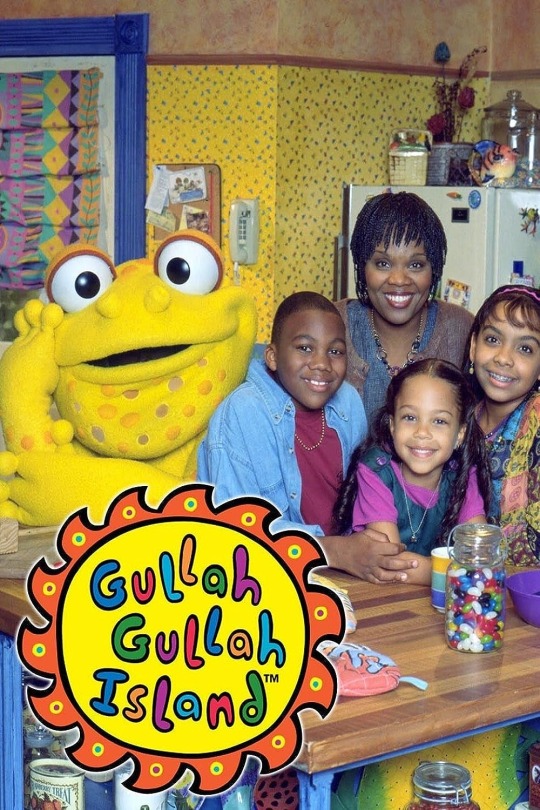
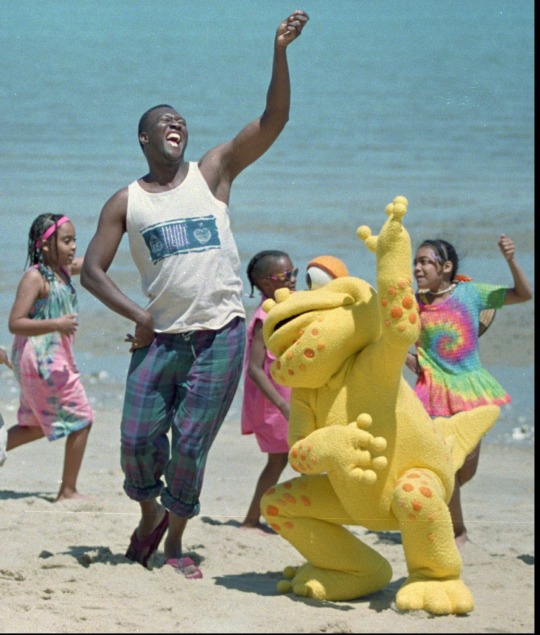

Commentary/Context/Memories: I actually saw the cast in concert, but my hyperactive self could not sit still, so I didn’t pay much attention. I feel so bad about it 😭
[Mod A: Awww please don’t feel bad about that! You were (likely) just a kid expressing your excitement in the way you knew best (unless you didn’t really want to go to the show). Concerts can be really hard to sit through as a kid regardless of if you’re interested in them or not! I also regret not really paying much attention to the Jonas Brothers (my first concert in 2008) bc I was not obsessed/had a crush on them the way my friend who took me had (should’ve been a sign I was gay in hindsight haha), even though I now think they had some great bops! Anyways back to the show: love the vibes of this show! I am normally creeped out by mascot costumes, but their friend Binyah Binyah Poliwog seems like a friendly lil frog! This show was a music-based show that aimed to educate kids about Gullah culture, who are an African American cultural community based along the coastline of North/South Carolina, Florida, Georgia and the Sea Islands that has a specific language and prominent arts/music culture because of relative isolation/shared African cultural heritage, the language is also known as Geechee (related to Creole). The show shared songs, art styles, dance, and stories important to the Gullah culture! I would like to learn more about this, because while I did know about Creole, I don’t know much about Gullah culture (so very glad to learn through researching this show!)]
75 notes
·
View notes